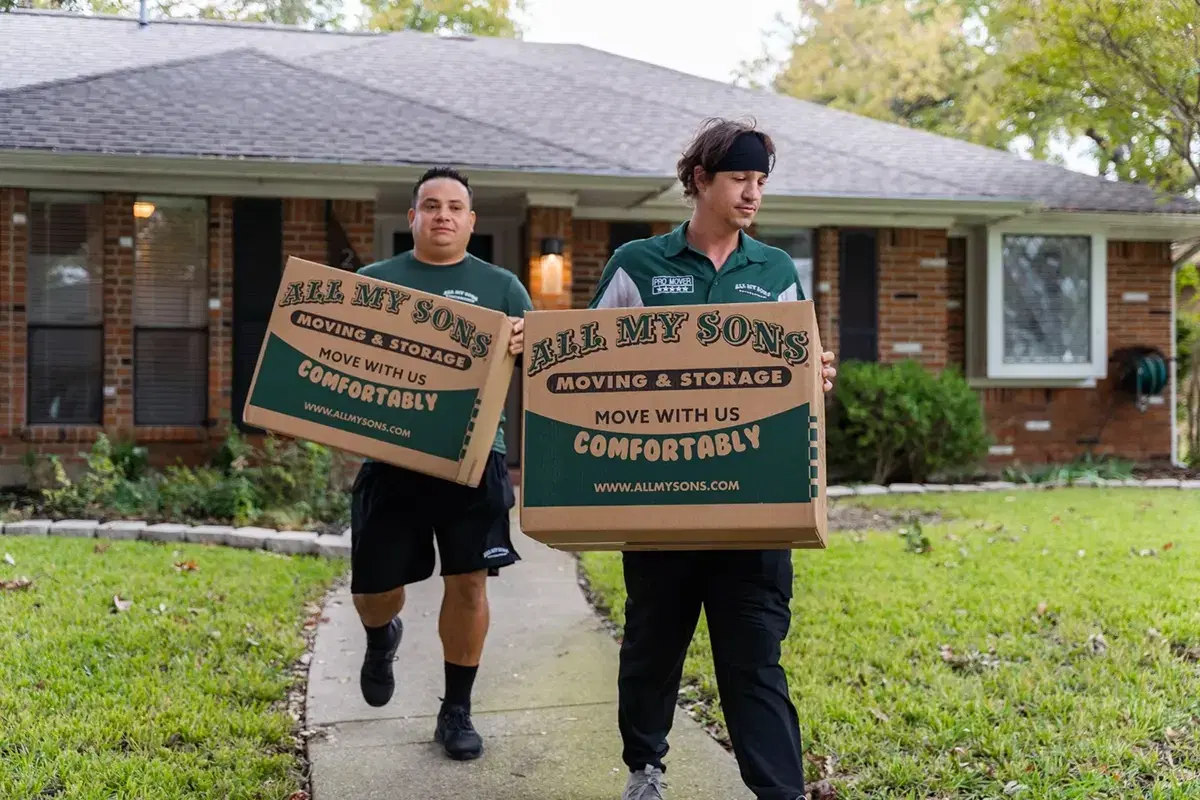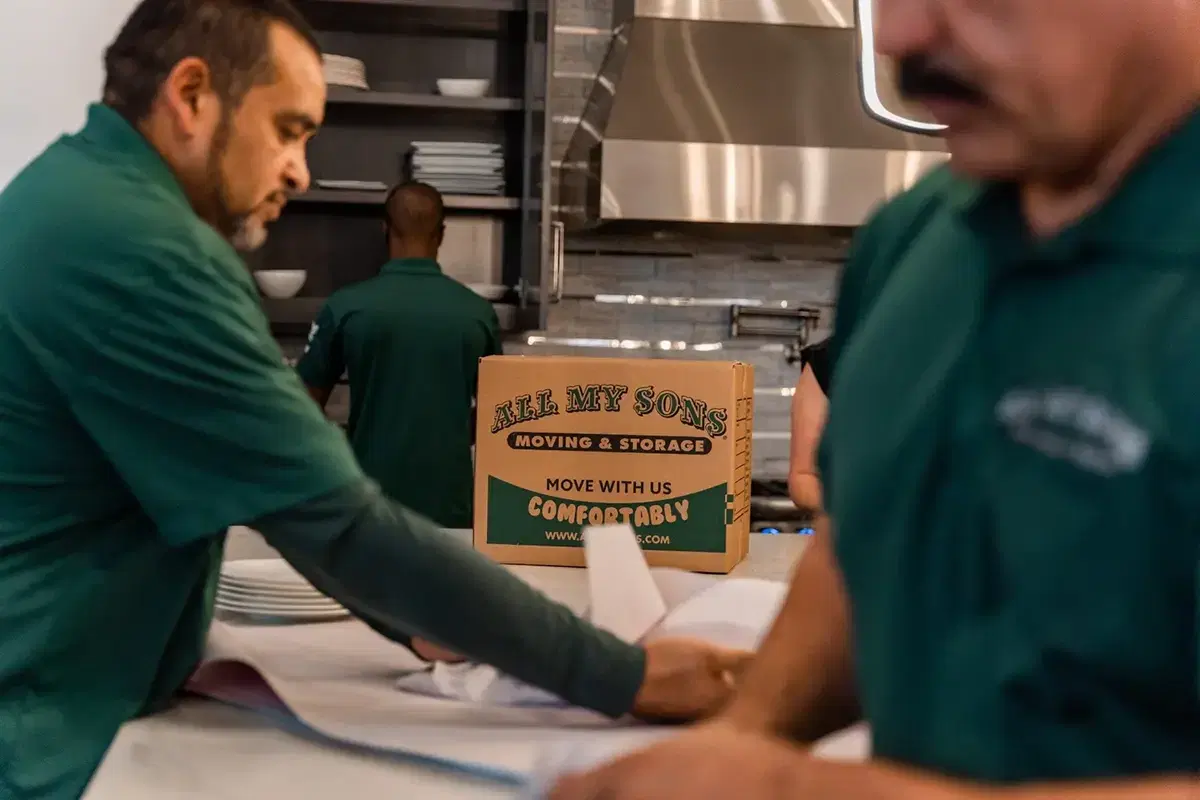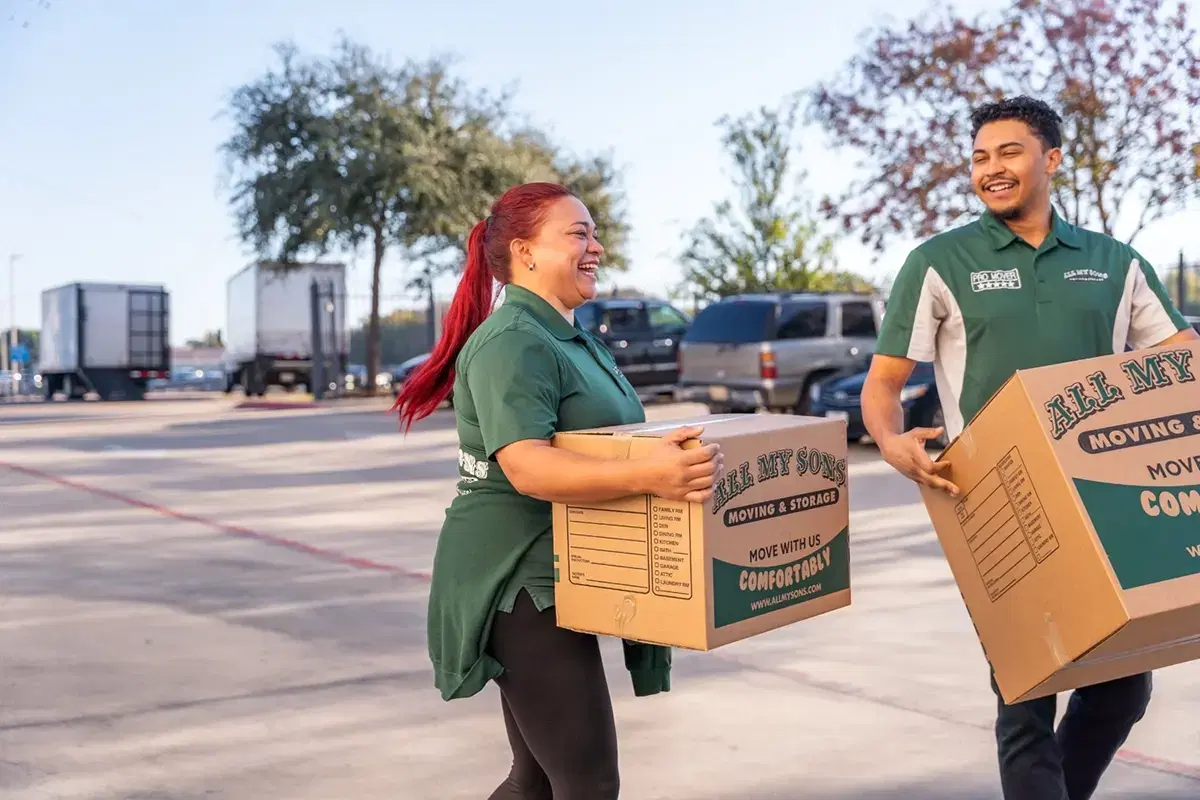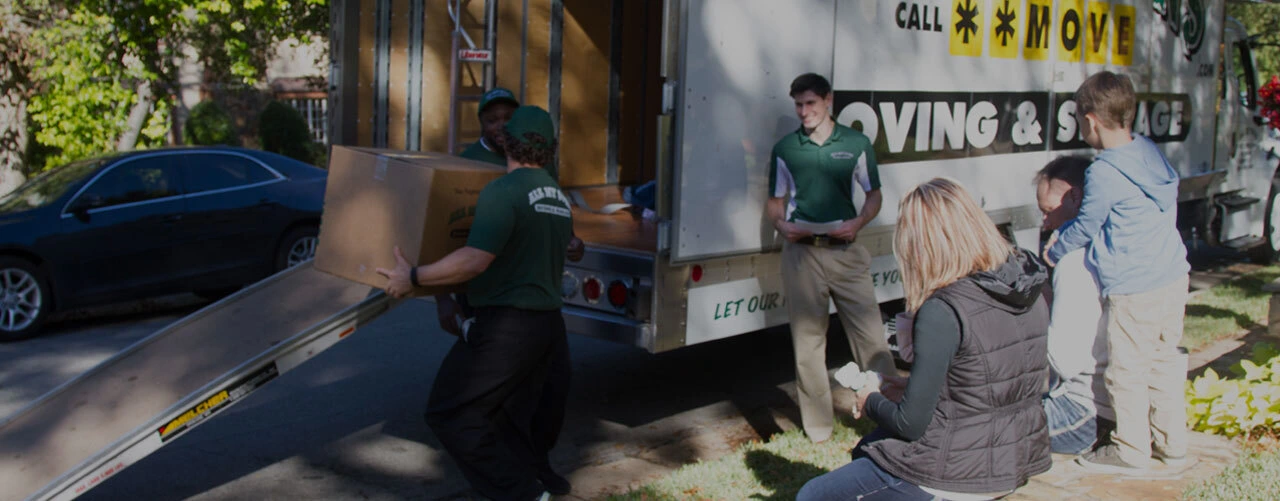A Checklist for the First-Time Homeowner
Are you buying a house for the first time? This is an exciting and important milestone for you and your family. Once the paperwork is signed and you are handed your keys, you’ll likely want to get started getting organized for your move.
All My Sons Moving & Storage has spent almost 30 years helping businesses and families make a seamless relocation and we understand how stressful buying a new home can be. Over the years we’ve learned that an organized move is an efficient move, so we have created these moving checklists to help our customers prepare for their move.
Use this checklist as a starting point for your move as a first-time home buyer.
BEFORE YOUR MOVE:
Provide Notice If you’re leaving the renter life behind, you will need to let your current landlord or rental property owner know that you are moving out. Your landlord probably provided their preferred timeframe for notice in your rental contract, so check your contract and be sure you understand the terms of providing notice or breaking your lease. Other parties that might need to be informed of your move include your employer and the financial institutions you work with.
Get a Professional Home Inspection Prior to closing, you should get a professional home inspection to best understand the pros and cons of the property you are moving into. The home inspection should be able to tell you what repairs may be necessary for the house to be safe and livable. If you decide to take on the cost of these repairs yourself then you may factor them into your moving budget.
Determine Your Budget Prepare for the typical moving expenses like professional movers, truck rental, moving supplies, and renting a storage unit. You should also keep money for the hidden moving expenses like cleaning fees, repairs, startup costs, and new furniture. Once you have an idea of how much you have to work with, you can make better financial decisions during your move.
Research Movers You want to trust your belongings to licensed and insured professionals with a great track record for customer service. Make a list of moving companies and compare quotes, services, and reviews before you make your final decision. If you are moving yourself, then ask family and friends ahead of time to make sure they are available to help with your move.
Declutter Moving is the perfect time to evaluate what in your household inventory is no longer serving you. Before you start packing your belongings, start sorting out the items you should give away, sell, or dispose of.
Create a Household Inventory Creating a household inventory is one great way to take stock of everything you own and note its condition prior to your move. Your household inventory could also serve you well after you move if there is a home disaster you need to make an insurance claim for. Choose a system for taking stock of your belongings that will work for you and then go room by room documenting your belongings and their condition.
Purchase Packing Supplies Once you have taken inventory of everything you own and sorted out what you will not be taking with you then you will have a better idea of how much packing material you will need. Get boxes, packing paper, bubble tape, and tape. If you are trying to save money on your move or move greener, you may be able to find used moving supplies on your social media groups.
Book Your Movers After you have spent some time researching movers you should choose your preferred company and lock in your reservation. If you are moving yourself, be sure any helpers you have recruited are ready and available for your move day and that your equipment and truck have been reserved as well. You should complete this at least one month before your move if possible.
Start Packing Non-Essentials The things you should pack first are the things that you won’t miss if they stay in a box for a while. You can typically start with your back closet items like off-season clothes, holiday decorations, and memorabilia items you don’t display. Then go room by room up your hierarchy of need.
Schedule Utilities for Disconnection Once you have given notice to your landlord, it’s time to give notice to your utility companies. Call your providers for gas, electricity, and internet and let them know you are moving. Services like internet you might be able to transfer to a new location but other services you will be scheduling for disconnection.
Change Your New Home’s Locks Unless you’re buying a new build, there’s a chance that your home has workable keys still floating around in the hands of others. Have your home’s locks changed prior to your move-in and get multiple copies of the keys for your household members. Make sure to get extras and make a plan in case you lock yourself out like keeping an extra key in a secure location or giving one to a neighbor.
Check New Home’s Security System If your new home comes with a built-in security system, take some time to check its function. Find any manuals the system needs and familiarize yourself with how it works. If your home does not have a security system installed, research your options for getting one installed.
Check New Home’s Smoke and Carbon Monoxide Detectors Smoke and carbon monoxide detectors can save your life, but only if they’re maintained and working. Test your detectors and find their manuals to learn how to keep them in working order.
Make Necessary Repairs or Renovations The best time to take care of any crucial repairs or renovations is before you move all your belongings into the house. You don’t want to be dodging furniture or boxes while you’re trying to fix things, and you likely don’t want debris or dirt from repairs getting on your things.
Deep Clean the New House Once repairs or renovations are complete, sweep out all the debris. Vacuum the floors, scrub surfaces, and toss out any dust bunnies. Your fresh start will feel a whole lot fresher if you begin your move from a clean slate.
Purchase New Essential Appliances As a first-time homeowner there might be appliances you need for your home that you do not own yet. Some essential appliances you might consider purchasing before your move-in include a washer, dryer, fridge, freezer, or microwave. If you purchase these items before you can move in then consider renting a storage unit to have somewhere safe to keep the item until your official move date.
Determine Furniture Needs Measure the rooms of your new house and take stock of how much space you have. It could be that the furniture that served you in your rental will not work in your new home, or you might have more space in your new home for furniture pieces you do not yet own. Make a list of furniture needs and enjoy furniture shopping.
Pack the Essentials When your move day is imminent, it’s time to start packing your everyday essentials. These items will typically come from your bathroom, bedroom, and kitchen. They will include things like toiletries, bed sheets, and silverware. Pack these items into boxes last, preferably the day before your move, and label them clearly as containing essentials. You will unload these from the truck first and unpack them first.
Pack an Essentials and Emergencies Bag There are some items you should keep on your person during your move. These include items you need for your move such as important documents, a boxcutter, and your keys, as well as items you might need in case of emergency like medications or a first aid kit. Pack a bag you will keep with you during your move.
Make a Donation Run After your decluttering is over and most items are packed, you will probably have items to donate. Take some time before your move to drop your donations off at the charity of your choice. Some charities offer pick up for bulk donations, so check the website of your favorite charity and see if that’s a option you want to take.
Call for Junk Removal If you have bulk items left over that will not be donated or moved with you, then call a junk removal company to come get them. Junk removal companies can donate, recycle, or properly dispose of any bulk items you have. They often offer same-day pickup.
Set Up Utilities You want your new home to be connected when you move in, so make sure all your utilities are active at your address. Get your electricity, gas, and home internet connected. If you need a cable or internet technician to come out and help you get things installed, then schedule that now.
DURING YOUR MOVE:
Supervise Your Movers Moving day has arrived. If you’ve hired professional movers, this part should be easy. Simply instruct your movers as needed and be available for any questions they might have. If you are moving yourself, then now is the time for you and your helpers to roll up your sleeves and start loading your truck. Make sure your essential boxes are loaded last to be unloaded first.
Clean Your Old Place As the rooms of your old place empty, give them a good cleaning treatment. Vacuum, scrub surfaces, and clean off bathroom fixtures. If you were a renter before then this is the best way to ensure you get your deposit back, provided there is no other damage to the rental.
Unload Your Essentials First Get your essential boxes off the truck and into their designated rooms first. You will unpack these boxes first. Once your essentials are unpacked, your place will start to move from chaotic box maze to livable home.
Assemble Essential Furniture You will want items like your bedframe and your couch assembled as soon as possible so that you have somewhere to crash after moving day is over. Assemble your most important pieces of furniture first.
AFTER YOUR MOVE:
Unpack and Organize Once the essential furniture is assembled and your essentials are unpacked, your home will be livable, but no one wants just livable for their home. Break the process of unpacking down into manageable steps so you don’t get overwhelmed. Once the décor is up and your books are loaded onto the shelves, your new house will start to feel more like home.
Buy Groceries We don’t recommend attempting to move perishable food from your fridge or freezer. Unfortunately this means that once you arrive in your new home, you will not have food on hand. Time to make an extensive grocery shopping trip and get all your food staples. When the fridge is stocked, you will be able to cook at home again and save money on takeout.
Make a List of Needs as they Arise After moving in, you might realize there are things your home needs that you do not have on hand yet. Keep a list of things you’d like to get for your new house. You might even be able to put these items on a gift registry list for your housewarming party if you throw one.
Purchase New Furniture, Décor, and Appliances You might move into your new space and realize that there’s a blank wall or floor space that you could put something in. Obtain new furniture and décor pieces to fill out your home. You can save money by purchasing items used or taking cast-offs from family or friends.
Make a Schedule for Home Maintenance Locate and read your manuals for any appliances or systems that come with your home. Set up a schedule for performing routine maintenance and checks.
File a Change of Address You can file a change of address with USPS up to three months before your move. It may take 7 days for mail forwarding to take effect. Some of your providers will be notified of your change of address this way, but we recommend you update them individually as well.
Update Your Driver’s License Some states allow up to 90 days of grace for you to change the address on your driver’s license. Other states require that you change your address immediately. Either way, you should update the address on your driver’s license as soon as possible. If you have moved within state lines you might be able to complete this step online, check your local government’s DPS website.
Register Your Vehicle If you have moved states, you will need to register your vehicle in your new state. How much time you have to do this depends on the state that you move to so check your local regulations. Remember to update your address with your insurance provider as well.
Update Your Address with All Your Providers Go through all your subscriptions, services, and medical providers and make sure they all have your updated address so you do not miss mail, reminders, or bills. Don’t forget delivery accounts and online stores that have your information saved. You’d hate to order food and have it delivered to your previous address.
Notify Friends and Family To get your holiday gifts, annual letters, and other mail from your friends and family, make sure your address is updated with all of them as well. Send out moving announcements to everyone in your contact list that you want to inform, or text, call, or email individuals.
Meet Your Neighbors Forging new friendships in your next community will help you feel more at home. Go door to door and introduce yourself to your neighbors. You can bring a small gift like baked goods or tea bags along with a card with your contact information.
Throw a Housewarming Party Moving into a house for the first time is a big milestone. Celebrate it with your loved ones and throw a special housewarming party. You can invite neighbors to make new community connections, play games, and offer snacks. You can even create a registry for your housewarming party and accept gifts of household goods you need or want.
Quick Moving Tips

How to Downsize Before a Local Move: Steps to a Fresh Start
The process of downsizing enables you to evaluate your belongings and determine what you truly want to keep in your life.

The Importance of a Moving Inventory for a Smooth Local Move
One of the most useful tools you can create during your moving process is a household or moving inventory.

Moving Checklist for a Last-Minute Move
Whether you’ve let moving procrastination get the best of you or something unexpected has left you preparing for a last minute move, this simple starter checklist is for you.


